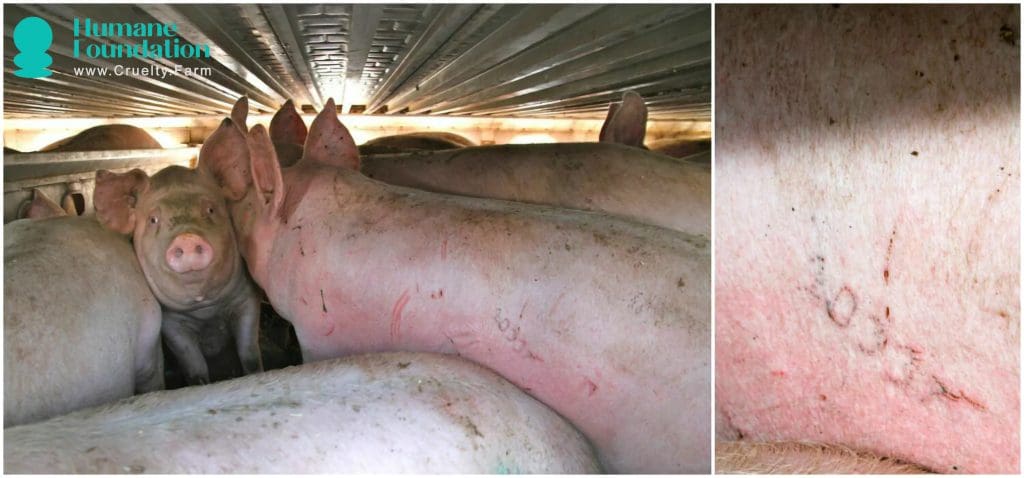In the shadowy operations of industrial farming, the transport of pigs to slaughter unveils a distressing chapter in meat production. Subjected to violent handling, suffocating confinement, and relentless deprivation, these sentient animals face unimaginable suffering at every stage of their journey. Their plight underscores the ethical cost of prioritising profit over compassion in a system that commodifies life. “Pig Transport Terror: The Stressful Journey to Slaughter” exposes this hidden cruelty and calls for urgent reflection on how we can build a food system that values empathy, justice, and respect for all living beings
Introduction
In the vast, often unseen world of industrial agriculture, the journey from farm to slaughterhouse for pigs is a harrowing and little-discussed aspect. While the debate over the ethics of meat consumption and factory farming rages on, the distressing reality of the transportation process remains largely hidden from public view. This essay seeks to illuminate the fraught path that pigs endure from farm to slaughter, exploring the stress, suffering, and ethical dilemmas inherent in this stage of the meat production process.
Transport Terror
The journey from farm to slaughterhouse for factory farmed pigs is a harrowing tale of suffering and terror, often obscured by the walls of industrial agriculture. In the pursuit of efficiency and profit, these sentient beings are subjected to unimaginable cruelties, their short lives marked by fear, pain, and despair.

Pigs, intelligent and emotionally complex animals, are denied the chance to live out their natural lifespan, which averages 10-15 years. Instead, their lives are abruptly cut short at a mere six months old, condemned to a fate of confinement, abuse, and eventual slaughter. But even before their untimely demise, the horrors of transport inflict immense suffering upon these innocent creatures.
To coerce terrified pigs onto trucks bound for the slaughterhouse, workers employ brutal tactics that defy all notions of compassion and decency. Beatings on their sensitive noses and backs, and the use of electric prods inserted into their rectums, serve as cruel instruments of control, leaving the pigs traumatized and in agony before their journey even begins.
Once loaded onto the cramped confines of 18-wheelers, the pigs are thrust into a nightmarish ordeal of confinement and deprivation. Struggling to breathe in the stifling air and deprived of food and water for the duration of the journey—often spanning hundreds of miles—they endure unimaginable hardship. The extreme temperatures inside the trucks, exacerbated by the lack of ventilation, subject the pigs to unbearable conditions, while the noxious fumes of ammonia and diesel exhaust further compound their suffering.
A former pig transporter’s chilling account reveals the gruesome reality of the transport process, where pigs are packed so tightly that their internal organs protrude from their bodies—a grotesque testament to the sheer brutality of their confinement.
Tragically, the horrors of transport claim the lives of more than 1 million pigs each year, according to industry reports. Many others succumb to illness or injury along the way, becoming “downers”—helpless animals unable to stand or walk on their own. For these unfortunate souls, the journey ends in a final indignity as they are kicked, prodded, and dragged off the trucks to meet their grisly fate at the slaughterhouse.
The staggering toll of suffering inflicted upon factory farmed pigs during transport stands as a stark indictment of an industry driven by profit at the expense of compassion and ethics. It lays bare the inherent cruelty of industrial agriculture, where sentient beings are reduced to mere commodities, their lives and well-being sacrificed on the altar of mass production.
In the face of such unspeakable cruelty, it falls upon us as compassionate individuals to bear witness to the plight of these voiceless victims and demand an end to their suffering. We must reject the horrors of factory farming and embrace a more humane and ethical approach to food production—one that respects the inherent worth and dignity of all living beings. Only then can we truly claim to be a society guided by compassion and justice.
slaughter
The scenes that unfold during the unloading and slaughter of pigs at industrial slaughterhouses are nothing short of horrific. For these animals, whose lives have been marked by confinement and suffering, the final moments before death are filled with fear, pain, and unimaginable cruelty.
As the pigs are herded off the trucks and into the slaughterhouse, their bodies betray the toll exacted by a lifetime of confinement. Their legs and lungs, weakened by immobility and neglect, struggle to support their weight, leaving some barely able to walk. Yet, in a tragic twist of fate, some pigs find themselves momentarily buoyed by the sight of open space—a fleeting glimpse of freedom after a lifetime of captivity.
With a surge of adrenaline, they leap and bound, their hearts racing with the thrill of liberation. But their newfound joy is short-lived, cruelly cut short by the stark realities of the slaughterhouse. In an instant, their bodies give way, collapsing to the ground in a heap of pain and despair. Unable to rise, they lie there, gasping for breath, their bodies wracked with agony from years of abuse and neglect on factory farms.
Inside the slaughterhouse, the horrors continue unabated. With staggering efficiency, thousands of pigs are slaughtered every hour, their lives extinguished in a relentless cycle of death and destruction. The sheer volume of animals processed makes it impossible to ensure a humane and painless death for each individual.
Improper stunning techniques only compound the animals’ suffering, leaving many pigs alive and conscious as they are lowered into the scalding tank—a final indignity intended to soften their skin and remove their hair. The USDA’s own documentation reveals shocking instances of humane-slaughter violations, with pigs found walking and squealing after being stunned multiple times with a stun gun.
The accounts of slaughterhouse workers offer a chilling glimpse into the grim reality of the industry. Despite regulations and oversight, animals continue to suffer needlessly, their screams echoing through the halls as they are subjected to unimaginable pain and terror.
In the face of such unspeakable cruelty, it falls upon us as compassionate individuals to bear witness to the suffering of these voiceless victims and demand an end to the horrors of industrial slaughter. We must reject the notion that animals are mere commodities, unworthy of our empathy and compassion. Only then can we truly begin to build a more just and humane society, one where the rights and dignity of all living beings are respected and protected.
Ethical Implications
The stressful journey from farm to slaughterhouse raises significant ethical concerns about the treatment of animals in the meat production industry. Pigs, like all sentient beings, have the capacity to experience pain, fear, and distress. The inhumane conditions and treatment they endure during transportation are antithetical to their welfare and raise questions about the morality of consuming products derived from such suffering.
Furthermore, the transportation of pigs highlights broader issues within industrial agriculture, including the prioritization of profit over animal welfare, environmental sustainability, and ethical considerations. The industrialized nature of meat production often results in the commodification of animals, reducing them to mere units of production rather than sentient beings deserving of respect and compassion.

Conclusion
“Pig Transport Terror: The Stressful Journey to Slaughter” sheds light on a dark and often overlooked aspect of the meat production process. The journey from farm to slaughterhouse is fraught with stress, suffering, and ethical implications for the animals involved. As consumers, it is essential to consider the welfare of the animals whose lives are sacrificed for our consumption and to advocate for more humane and ethical practices within the meat industry. Only by acknowledging and addressing the inherent cruelty of the transportation process can we begin to move towards a more compassionate and sustainable food system.
4.5/5 - (26 votes)



